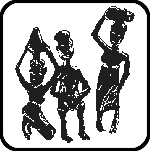 |
| The light fades
rapidly now. Wisps of salmon and gold cloud catch in the clear sunrays that fan
through aquamarine sky above the silhouettes of trees along the far rim of the vlei.
In the foreground, smoke rises in three vertical columns from the cooking fires
around the squatters' huts. It rises up, forever up, until it disappears in the
sunset. The smoke columns appear suspended in the air of the vlei like fixtures of the landscape. Yet they change constantly: now they are thin and white; now one billows into a turmoil of black and swirling red embers; now all three settle to dense yellow grey; now they are mere shapes playing with the dusk. There is an unnatural quiet over the land: a stillness like a vacuum waiting for sound: a tense changing-of-the-guard between species of the day and species of the night. From the squatters' huts comes an infant's wail, quickly extinguished. Across the vlei a dog howls. Mosquitoes materialise from nowhere to buzz loudly around our ears. The dry grass beside us is suddenly alive with the irregular chirping of crickets. Frogs croak in the bottom of the vlei. Somewhere a bird flies rapidly through the dusk calling: "Whip, whip, whip-or-wai..ail." And now from up the vlei towards Kiambu come the thrum-thrum, thrum-thrum, thrum, thrum-thrum of drums. The rhythm of drums pulses through the valley, echoing louder and louder. Before the echo fades, the air around us erupts with drumming. The ground, the bush, the grass, the trees vibrate with drumming. The tin roof of the workshop screeches in discord against the drumming. My father pulls me quickly onto the path that Mwangi took through the long grass. When we have passed the eucalyptus trees, we see the orange glow of a paraffin lamp on the verandah of the servants' quarters. The lamp becomes a beacon, but it gives no light: the air around us is a dense, suffocating, pulsating black. My father rushes me faster and faster till we are thrashing through the grass. The grass clings around my legs and hips; it scratches my hands and the undersides of my arms through the wool of my cardigan. I trip in a hole. My father yanks me up by the arm and hurries on. The crickets grow silent as we pass. I hear my father breathing hard. A film of cold sweat develops between our palms. The stars come out, but there is no moon. The starlight is a febrile grey that transforms all the familiar shapes to grasping, clawing, clutching fingers and sucking, screaming mouths. At last we reach the worn Kikuyu grass in front of the servants' quarters. No one is there. The doors are closed. No fire is lit. The paraffin lamp, its wick turned low, hangs from a bent nail haphazardly pounded into the wooden frame of the verandah roof. Now it is only a short distance home. When we are around the servants' quarters we can see the lights of our house. We are both panting hard. We start to run. A stitch develops in my side. I bend nearly double with the pain. By the time we reach the verandah I can barely walk. Never before has our verandah appeared such a cosy, impregnable haven. The moth- battered light bulb above the door imparts a new comfort and warmth to the red concrete floor, and softness to the crude whitewashed walls. The curtains over the French doors and the windows are drawn shut, but they let out chinks of light that bespeak calm and normalcy. There is a womb-like peace here, immensely soothing. My father cups his head in his forearm and leans against a pillar until his breathing is no longer laboured. I sit on the smooth concrete edge of the verandah and hug my knees, only distantly aware of the prickly burrs that cling to them. I look out at the whitewashed walls around the garden, which glow dimly in the starlight. A cone of warm yellow light shines from the open kitchen door at the end of the house. I hear pans rattle and water being drawn. The chorus of crickets and frogs and drums throbs around us like the heartbeat of the early night, as comforting as a lullaby. My father and I say nothing; we will never acknowledge the terror we have felt tonight. Here in the safety of the verandah it seems ridiculous. It is not late. It is only a few minutes after seven o'clock: time for the BBC news. I have often been out at this time before. I remind myself that I neither saw nor heard anything new tonight. And before I was never afraid, not like tonight. But no, something is different tonight. My head aches trying to think what it is. Finally my father knocks on a metal-bound pane of the French doors, and Munyao comes to let us in. As we pass into the warm familiar light of the living room, I know what is different: Tonight there is no singing with the drums. |
© 1987, Mary Lynn Richardson |
